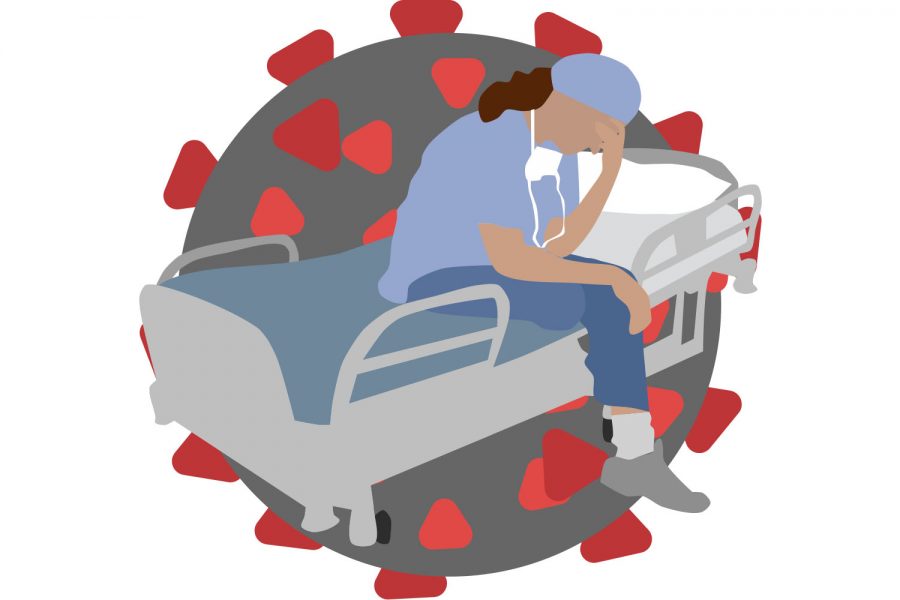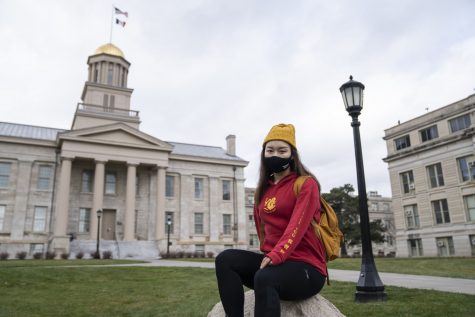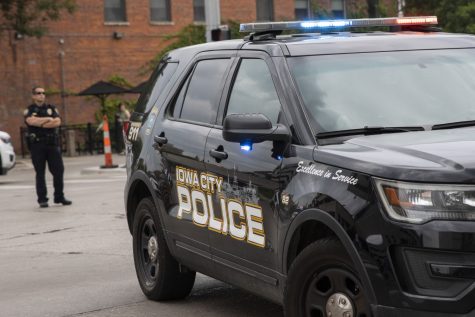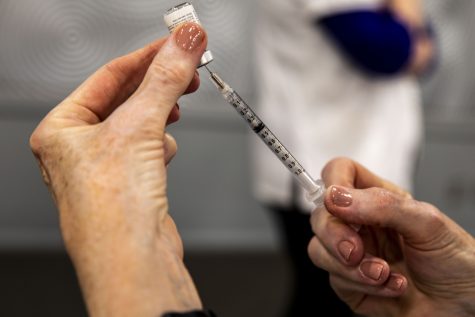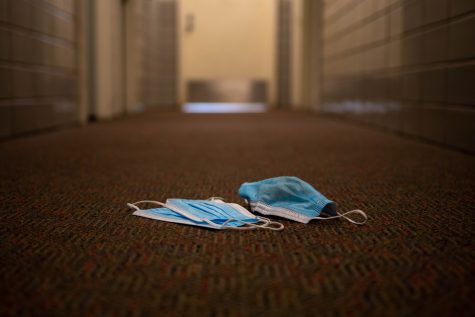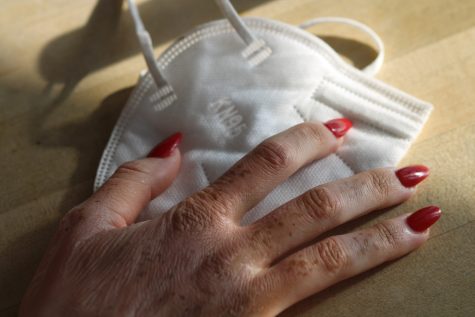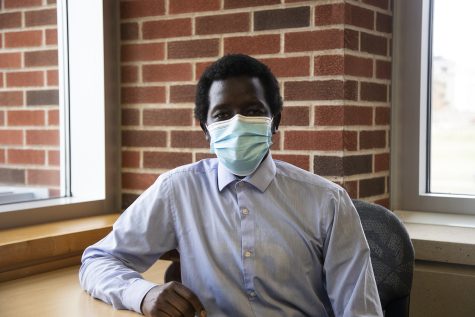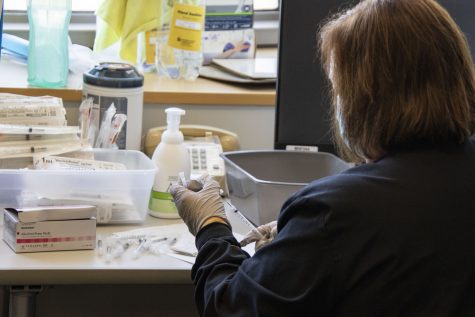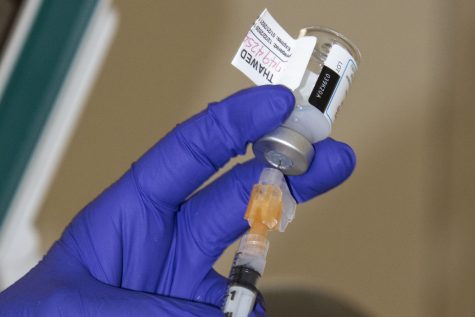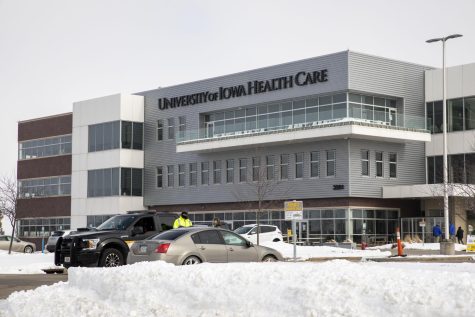With cases rising, University of Iowa officials warn Iowa hospitals will soon be overwhelmed
Iowa broke records for hospitalization over the weekend, and experts are warning that Iowa’s healthcare system will be overwhelmed.
November 15, 2020
Iowa’s doctors and scientists issued dire warnings over the weekend as hospitalizations continued to rise across the state, threatening — and in some cases already — overwhelming hospitals in the state.
“Sunday morning in the hospital. It’s happening. Hospitals filling. ICUs are filled. Rationing critical care resources and treatments. Nurses and doctors staring at each other in disbelief. We know. This bloody sucks,” University of Iowa epidemiologist Eli Perencevich wrote on Twitter Sunday.
Over the last week, hospital specialists have continued to sound the alarm on Iowa’s rapidly rising COVID-19 cases. Last week, a Mercy Health Care physician, Stephen Scheckel, told Johnson County leaders 15 out of 17 hospitals did not have any ICU beds available for critical care patients.
“The sickest patients are going to need ICU services yet of those 17 hospitals we only can send those patients to two hospitals and it won’t take long for those to fill up,” Scheckel said in the Nov. 12 meeting.
As of Nov. 15, 1,279 Iowans were hospitalized with COVID-19, the highest number since the pandemic began. According to the Iowa COVID-19 dashboard, 34 percent of hospital beds in the state are currently available.
In RMCC region five, which includes Johnson County, only 21 percent of inpatient beds were available on Nov. 14. 287 COVID patients are currently hospitalized in the region.
University of Iowa Hospitals and Clinics head epidemiologist Jorge Salinas said in a Nov. 10 Facebook Live that the epidemic in Iowa is worsening, with 3,000 – 4,000 new cases reported everyday, and said this is the worst the pandemic has been in Iowa.
“It’s problematic at many levels. When the incidence of COVID goes up in the community there are more people who are sick, who cannot go to school, to work, they may need to go to the hospital,” he said. “This amount of transmission can put too much pressure on to hospitals and can impact the health outcomes of those who have COVID-19 and those who don’t have COVID-19,” Salinas said.
Salinas urged those who have essential appointments at UIHC to still come to the clinic.
On Nov. 9, UIHC Chief Executive Officer Suresh Gunesekaran sent an email to hospital employees, asking those who are able to work from home do so as the hospital prepares for a surge in COVID-19 cases.
Gunesekaran said if employees are approved to work from home, employees will be expected to take unpaid week or weeks to increase environmental safety for patients and staff.
RELATED: UIHC CEO says its ready for surge capacity as COVID-19 hospitalizations climb
In response to the jump in cases, Iowa Gov. Kim Reynolds issued new restrictions, limiting indoor gatherings to 25 people, and outdoor gatherings to 100 people, unless participants are wearing masks. But, those don’t include schools or religious gatherings.
Reynolds also placed restrictions on school sporting events, limiting indoor games to two spectators per participant.
The situation in Iowa made national headlines this past weekend, with UI experts speaking their minds in The Atlantic and ProPublica.
UI Professor of Internal Medicine Eli Perencevich was quoted in The Atlantic saying “the health-care system in Iowa is going to collapse, no question.”
Associate Chief Medical Officer for Medical Care at UIHC Gregory Schmidt told ProPublica that the hospital is converting 16 extra beds in the hospital to ICU space in anticipation of a surge in cases.
“People in leadership are starting to say things in meetings like, ‘I have a sense of impending doom,’” he was quoted saying.
As cases in Iowa and nationwide continue to rise, pharmaceutical company Pfizer announced on Nov. 9 that its potential vaccine was 90 percent effective in clinical trials.
Salinas said he is optimistic about the possibility of the Pfizer vaccine being approved for use by the end of the year.
“We don’t know how many doses will be available,” Salinas said. “I want to continue being optimistic. This is great news. I think that this is going to change the game all together and will help decrease the numbers tremendously in the United States and globally.
Iowa’s Nov. 8 task force report called Iowa’s “unyielding COVID spread across Iowa continues.”
“The unyielding COVID spread across Iowa continues with new hospital admissions, inpatients, and patients in the ICU at record levels, indicating deeper spread across the state,” the report read. “The most recent trends, showing steep inclines across all indicators, need immediate action including mask requirements to decrease severity in morbidity and mortality among Iowans.”



